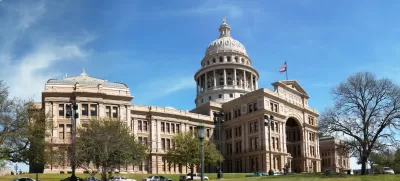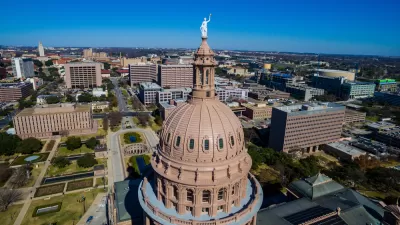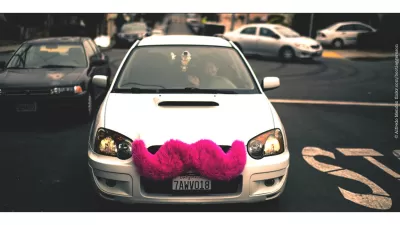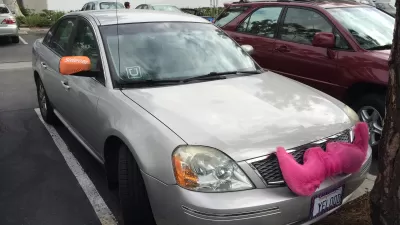In the spirit of civic self-congratulation, Austin resident Richard Parker writes about how the transportation network company giants canceled service after losing a referendum vote. He ascribes this victory to the city's enduring contrarian streak.

Earlier this month in Austin, Texas, voters struck down a measure that would exempt Uber and other transportation network companies from driver fingerprinting. Richard Parker writes that it became "a referendum on who is in the driver's seat (pun intended) when it comes to the public weal: new-economy powerhouses out to 'disrupt' society for fun and profit, or the people they're seeking to disrupt. In Austin, it wasn't even close."
When they lost the vote, Uber and Lyft quit the Texas capital two years after they arrived.
According to Parker, transportation network companies weren't always the public enemy they apparently became. In 2014, with the city full of young creatives, festival-goers, and other Uber-friendly types, transportation network companies seemed like "the perfect fit."
"But what [the companies] failed to appreciate was that Austin's long and storied counterculture wasn't just a marketing pose." Parker writes that many in Austin have resisted the city's transformation into a techie paradise just as hard as they fought Texas' prevailing conservative politics. Some even blamed the companies for worse traffic when drivers developed a habit of stopping mid-street to pick up customers.
He also clarifies that the decision to cut off service wasn't Austin's. "To be clear: The city never told Uber and Lyft to leave. But it did insist that they play by our rules and have drivers be fingerprinted, just like cabbies — particularly after the police investigated at least seven alleged sexual assaults by ride-share drivers in 2015."
FULL STORY: How Austin Beat Uber

Planetizen Federal Action Tracker
A weekly monitor of how Trump’s orders and actions are impacting planners and planning in America.

Maui's Vacation Rental Debate Turns Ugly
Verbal attacks, misinformation campaigns and fistfights plague a high-stakes debate to convert thousands of vacation rentals into long-term housing.

San Francisco Suspends Traffic Calming Amidst Record Deaths
Citing “a challenging fiscal landscape,” the city will cease the program on the heels of 42 traffic deaths, including 24 pedestrians.

Defunct Pittsburgh Power Plant to Become Residential Tower
A decommissioned steam heat plant will be redeveloped into almost 100 affordable housing units.

Trump Prompts Restructuring of Transportation Research Board in “Unprecedented Overreach”
The TRB has eliminated more than half of its committees including those focused on climate, equity, and cities.

Amtrak Rolls Out New Orleans to Alabama “Mardi Gras” Train
The new service will operate morning and evening departures between Mobile and New Orleans.
Urban Design for Planners 1: Software Tools
This six-course series explores essential urban design concepts using open source software and equips planners with the tools they need to participate fully in the urban design process.
Planning for Universal Design
Learn the tools for implementing Universal Design in planning regulations.
Heyer Gruel & Associates PA
JM Goldson LLC
Custer County Colorado
City of Camden Redevelopment Agency
City of Astoria
Transportation Research & Education Center (TREC) at Portland State University
Jefferson Parish Government
Camden Redevelopment Agency
City of Claremont





























